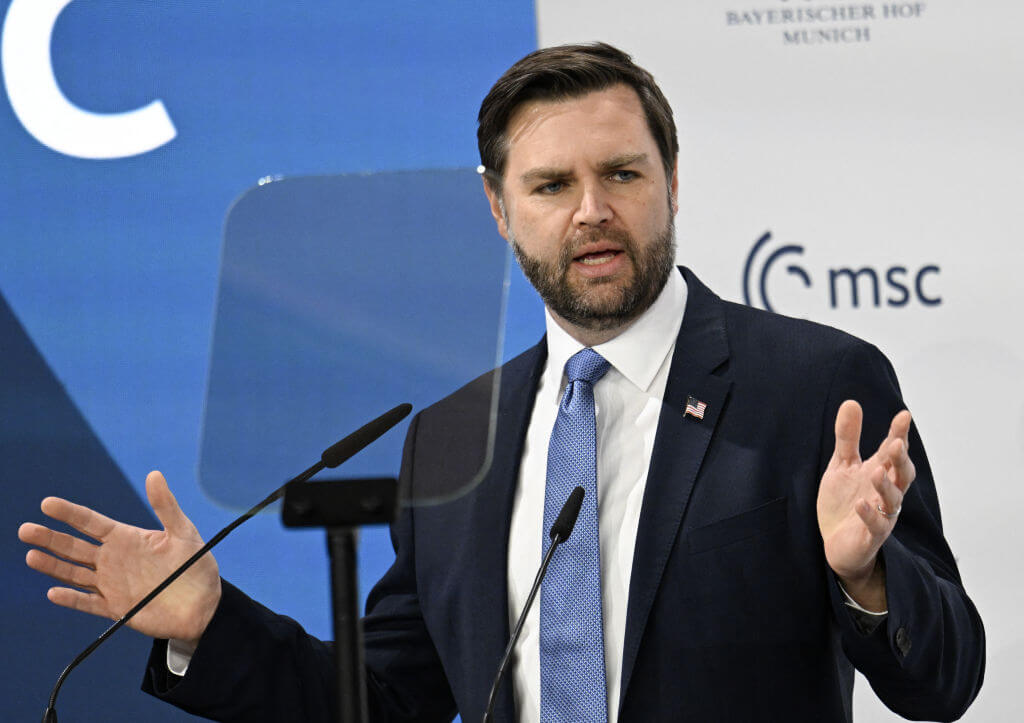Rubio defends Vance’s meeting with Germany’s far-right AfD party
The Secretary of State said it was not historically accurate to compare the modern-day party to the Nazi regime

Vice President JD Vance at the Munich Security Conference on Feb. 14. Photo by Thomas Kienzle/AFP via Getty Images
Secretary of State Marco Rubio on Sunday defended Vice President JD Vance’s decision to meet with the Alternative for Germany (AfD) party, dismissing criticism that its nationalist rhetoric echoes Nazi ideology. Vance, who spoke at the annual Munich Security Conference on Friday sparked backlash for meeting with AfD leader Alice Weidel after scolding European leaders for boycotting the party.
In an interview with CBS’ Face the Nation, Rubio dismissed comparisons between the AfD and the Nazi regime. “There was no free speech in Nazi Germany,” he said. “There was also no opposition in Nazi Germany, they were a sole and only party that governed that country. So that’s not an accurate reflection of history.”
Jewish groups condemned the meeting, pointing to AfD’s record of downplaying the Holocaust and promoting anti-immigrant policies. The American Jewish Committee highlighted the party’s “clear record of antisemitism and hostility to America.” Weidel recently doubled down on her past comments that Germany’s Holocaust remembrance constitutes a “guilt cult.”
The AJC noted that Björn Höcke, one of the AfD’s leaders, was charged twice by the government for using banned Nazi phrases and was nearly expelled from the party after calling the Memorial to the Murdered Jews of Europe a “monument of shame.” Höcke also advocated for a “national turnaround” in how Germany confronts its Nazi past.
Rep. Daniel Goldman, a Jewish Democrat from New York, called the AfD a “neo-Nazi party” and criticized the Republican Party for “being so quiet about this signal of antisemitism” following Vance and Elon Musk’s support for the AfD ahead of German elections next Sunday. Recent polls put the AfD in second place with 20%, ahead of Chancellor Olaf Scholz’s center-left Social Democratic Party.
In his remarks at the Munich conference, Vance criticized European efforts to isolate far-right parties, though he did not mention AfD by name. “What German democracy — what no democracy — American, German or European — will survive is telling millions of voters that their thoughts and concerns, their aspirations, their pleas for relief, are invalid or unworthy of even being considered,” Vance said.
On Thursday, Vance visited the Dachau concentration camp in Germany, describing it as “moving” and a powerful reminder of the unspeakable atrocities committed against the Jewish people during the Holocaust.
Rubio praised Vance’s speech as “historic” and said it was a valid critique of the erosion of free speech in Europe. “I think allies and friends and partners that have worked together now for 80 years, should be able to speak frankly to one another in open forums without being offended, insulted, or upset,” he said.
On Sunday, Rubio visited the Yad Vashem Holocaust memorial in Jerusalem during a diplomatic visit to the region.
















